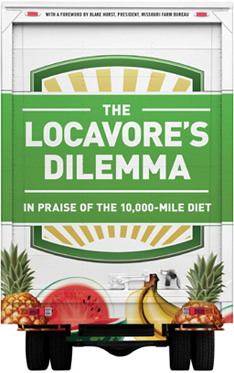|
As they see things, our
modern-day genetically-modified “corn-utopia” is soaking up a rapidly
vanishing petroleum pool while delivering junk food, cancer epidemics,
rural poverty, and agricultural pollution. The way forward, they tell
us, actually requires several steps backward to a simpler time when
consumers personally knew and trusted the farmers that fed them…
Fortunately, the locavores’ dire
vision is at odds with the relevant data. Although it undoubtedly pains
most of them to hear this, we live (much) longer and healthier lives
than our ancestors; the overall state of our environment has improved
significantly over the last century; and our food supply is cheaper,
safer and more secure than ever before.(1)
In our book The Locavore’s Dilemma: In Praise of the 10,000-mile Diet (reviewed for
this blog by Alex Epstein), we draw on economic logic and basic
scientific, geographical and historical facts to illustrate how the
long-distance trade in foodstuffs played a critical role in bringing
about such positive trends. What the world really needs, we argue, is to
get rid of trade barriers, agricultural subsidies and uneconomical and
environmentally unsound policies such as the ethanol mandate so that
more food can be produced more cheaply in the world’s best locations by
ever more efficient farmers.
|
Politically Incorrect Debate in
Full Swing |
 To our surprise, our politically
incorrect piece of work received
much (and by and large fair) coverage.
Of course, many diehard locavores quickly denounced us as paid shills of
Monsanto. A prominent Canadian food activist called us “baby killers” to
our faces. An anonymous reviewer on Amazon.com was in such a hurry to
point out the errors of our ways that she didn’t notice that the book
was co-authored.
To our surprise, our politically
incorrect piece of work received
much (and by and large fair) coverage.
Of course, many diehard locavores quickly denounced us as paid shills of
Monsanto. A prominent Canadian food activist called us “baby killers” to
our faces. An anonymous reviewer on Amazon.com was in such a hurry to
point out the errors of our ways that she didn’t notice that the book
was co-authored.
Someone else even accused Hiroko
of being a Chinese spy because of a student exchange program she
participated in over a quarter of a century ago! To modify somewhat the
old legal pun, when you don’t have either logic or facts on your side,
fill the comment section of websites with ad hominem attacks.
As could also be expected, a few
negative reviews in prominent outlets distorted or omitted some of our
key arguments. Luckily, the mastermind behind Master Resource gave us
the opportunity to address them concisely. So here goes:
- Locavorism is not really about
geography
Writing in The American
Prospect, Sarah Laskow
accuses us of taking a very narrow (i.e., geographical) view of
“local food,” whereas to food activists “buying local has mostly been a convenient shorthand for buying food that’s grown in a more broadly
sustainable way.” Well, guilty as charged on this one. It is apparently
very difficult for an old-school geographer (not to say most
dictionaries) to interpret “local” as anything other than something
related to a particular place.
Of course, one of the main goals
of geography as a discipline is precisely to help people understand that
no two places are exactly alike. Geographical differences, in turn, give
us the opportunity to produce things (whether crops or livestock) more
effectively in some areas than others.
The result is not only more food
for less money, but also significant environmental improvements as
long-distance trade has long made it possible to relocate countless
productions from less desirable to more desirable locations (say, when
grain production was moved from hilly, rocky and erosion-prone terrain
to flatter regions endowed with better soils and better climate).
- Feeding a straw man to our
readers
Most locavores, it turns out,
don’t really want to give up coffee, chocolate and orange juice. And not
all of them are romantic luddites – after all, what are urban vertical
farms if not revolutionary (despite the fact that the basic concept has
been around for something like a century and never profitably acted
upon…)!
True, we do make the case
against going completely loco, but our goal is not to set up a straw
man; it is rather to illustrate that less of a bad thing does not make
it a good thing. In other words, if most locavores do not want us to
drink a whole bucket of arsenic, they nonetheless insist on a few
glasses. Moderation in such cases, however, hardly makes for a healthy
prescription.
|

